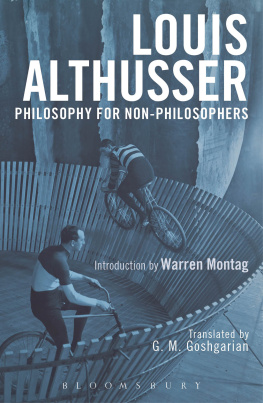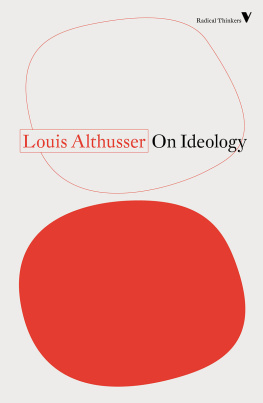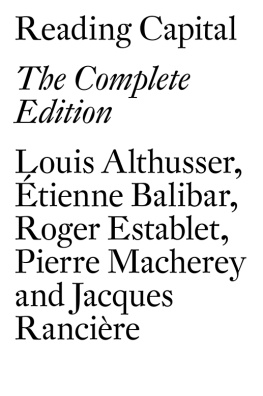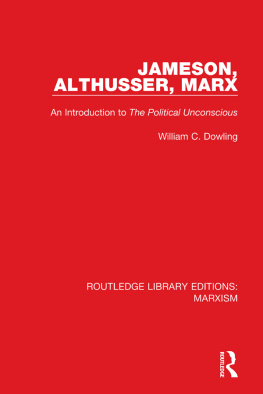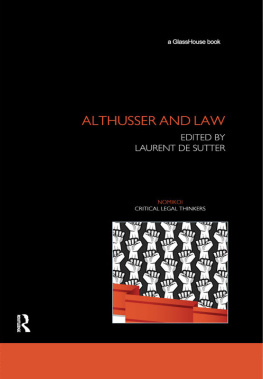
HOW TO BE A
MARXIST IN
PHILOSOPHY
ALSO AVAILABLE FROM BLOOMSBURY
Philosophy for Non-Philosophers, Louis Althusser
Being and Event, Alain Badiou
Conditions, Alain Badiou
Infinite Thought, Alain Badiou
Logics of Worlds, Alain Badiou
Theoretical Writings, Alain Badiou
Theory of the Subject, Alain Badiou
Key Writings, Henri Bergson
Lines of Flight, Flix Guattari
Principles of Non-Philosophy, Francois Laruelle
From Communism to Capitalism, Michel Henry
Seeing the Invisible, Michel Henry
After Finitude, Quentin Meillassoux
Time for Revolution, Antonio Negri
The Five Senses, Michel Serres
Statues, Michel Serres
Rome, Michel Serres
Geometry, Michel Serres
Leibniz on God and Religion: A Reader, edited by Lloyd Strickland
Art and Fear, Paul Virilio
Negative Horizon, Paul Virilio
Althussers Lesson, Jacques Rancire
Chronicles of Consensual Times, Jacques Rancire
Dissensus, Jacques Rancire
The Lost Thread, Jacques Rancire
Politics of Aesthetics, Jacques Rancire
Of Habit, Flix Ravaisson

CONTENTS
G.M. Goshgarian
I
On 11 June 1984, Althusser called one of his many unreleased manuscripts to the attention of the Mexican philosopher Fernanda Rytmann in a fit of madness in 1980.
A French version of Filosofa y marxismo was published in April 1994. It became the prolegomena to the reference text for Althussers late philosophy with the appearance of Le courant souterrain du matrialisme de la rencontre in fall of the same year. Extracted from a chaotic mass of manuscripts dating from 198283 and almost certainly revised thereafter, this fragment had soon sparked a fascination for the late Althusser that shows no signs of diminishing.
The posthumous celebrity of the Althusser of the 1980s has no doubt been bolstered calculation or contingency? by the occultation of the Althusser of the immediately preceding period, whose most important texts were not published for decades to come or, in some cases, have still not been. For the untimely thought of the Althusser of the 1970s continues to provoke a fierce hostility that mellows into disdain and yawning indifference only when his detractors succeed in assuring themselves of its utter irrelevance to their present. That is all the easier to do in that, with rare exceptions, even his well-disposed commentators have helped maintain the buffer zone around the philosopher of the encounter by confining their engagement with his dogmatic predecessor to his proclamations of the crisis of Marxism, widely celebrated, on Antonio As for the solutions to the crisis proffered in the texts supposed to have heralded this turn, they belong, by common consent, to another age.
Yet an informed reading of Filosofa y marxismo blurs the line of demarcation thus drawn between the late and the superannuated Althusser, a staunch defender of the dictatorship of the proletariat, among other currently unthinkable ideas. For the interview of the 1980s is, in essence, a patchwork of extracts from, or rsums of, texts that Althusser produced in the 1960s and 1970s as if the interviewee wished to flag the fact that the founding concept of his late philosophy, the encounter, appears throughout his work, if under various aliases: accident, accidental node, accumulation, combination, combination of circumstances [concours], conjunction, conjuncture, entanglement [enchevtrement], and even encounter. This is one index among many that Althussers turn, if turn there was, came about by way of a re-turn.
To be sure, the mere presence of such terms in his earlier work proves nothing. Is not the basic principle of the in such a way as to constitute the effects of this conceptual structure through the retroaction of the result upon its becoming.
theory of the encounter and the later Althusserian reading of Epicurus, assigned the role of aleatory materialisms founding father once the encounter took?
The result was at least, and perhaps at most, a translation of Althussers theory of the encounter or accident These reformulations are at the heart of an exposition of an aleatory materialism about which the reader will decide, after comparing it with previous avatars of Althusserian materialism, whether it stems from a Kehre, a continuing break, a linear evolution, or a simple reprise.
She can make the comparison without immersing herself in The Underground Current. For the first presentation of the materialism of the encounter to propose these redefinitions makes up Chapter 16 of the book she has in her hands, the 1976 manuscript that Althusser recommended to his Mexican
II
Althusser took up the cudgels for his friends book, the main thesis of which he professed to share.
In fact, he defended a much broader thesis: that nearly every major philosopher shared Revels. It was of course true that philosophys basic pretension is to possess knowledge beyond ordinary mortals ken, knowledge that, in its own estimation, entitles it to exist: the philosopher always knows, more or less, what the radical origin of things is what the true meaning of what others know is [and] the meaning of the acts in which they are engaged. Nevertheless, in a more historical perspective, it becomes clear that the philosopher seeks his titles to existence, not in philosophy as such, but in an antagonistic encounter with it: the great philosophers define themselves as a function of the philosophies that they reject. Philosophy is a combat in which every combatant feels the need to get rid of existing philosophies.
The attempt to do away with philosophy is thus philosophys founding act. Every philosopher (except perhaps the first) is an anti-philosopher.
But how can one be an anti-philosopher without being a philosopher? How can one take a sort of originary distance from the world of philosophy that would not be philosophical? How can one reject philosophy without founding a philosophy?
The young Marx shows us the answer by example, according to the young Althusser (he would turn thirty-nine a week later). Hardly had the science of history been founded than its founder mobilized it in an assault on the rear base of the philosophy of his time, its dominant ideology, with a view to neutralizing all philosophy, past and present. He thus demonstrated
It was by practising it as a science that the Althusser of the early 1960s sought to do away with all hitherto existing philosophy. His
One would be hard put to characterize better, in so few words, the idealistic philosophy of the essence of everything and its opposite that Althusser is at pains to deconstruct in How to Be a Marxist in Philosophy, from Plato through Kant to itself a revised version of the detailed 196667 self-criticism of which Althusser was to release only a few fragments in prefaces to re-editions and translations of Reading Capital.
The mid-1960s self-criticism crystallized after a lost battle during which he had defended a science of history threatened, in his view, by pseudo-Marxist reformists intent on recasting Marxs revolutionary theory as the highest stage of bourgeois It was in the wake of his failure to do so that he became aware of the idealist Trojan horse within the confines of his own materialism, and went on to reject as theoreticist the notion of a scientific philosophy just briefly evoked.
Next page

